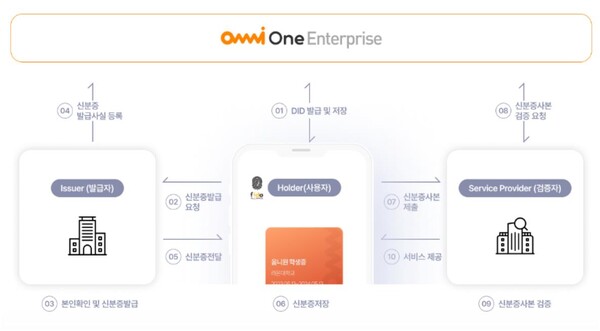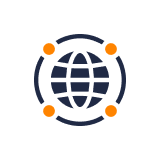Op
Open DID Governance
1d ago
Notice
[국문 원문]
제목: “K-DID, 오픈소스 타고 글로벌 진출 모색” [심호성의 K-오픈소스]
-----
기사 본문, 하단 링크 참조:
(https://it.chosun.com/news/articleView.html?idxno=2023092122048)
-----
IT 조선 / 심호성 부회장, 한국공개소프트웨어협회
원문 : https://it.chosun.com/news/articleView.html?idxno=2023092122048)
[원문 기사 영어 번역 본]
Subject: "K-DID seeks to enter global markets with open sources"

Open source is now essential for IT companies to enter the global market. This is not only because of the needs of foreign consumers who do not want to be subordinated to a company's technology, but also because of the supplier strategy to increase the efficiency of market development and communicate smoothly with overseas developers through an open source method. Let's pay attention to the case of RaonSecure, which promotes this in the security field.
From 2025, the era of getting a mobile resident registration card for anyone over the age of 17 is just around the corner. The Ministry of Public Administration and Security is introducing mobile identification cards, including mobile driver's licenses and mobile veterans' registration cards, in order, starting with mobile civil service cards in 2021.
The Ministry of Public Administration and Security is building a national mobile identification system that enables "Self-Sovereign Decentralized Identification (DID)", which has excellent personal information protection functions and selectively provides its information. Blockchain-based DID technology is a technology that is of high interest worldwide, and Korea is using resident registration cards, passports, and driver's licenses as key technologies in implementing mobile identification.
Countries around the world are attempting to digitize and introduce identification cards (digital IDs), and the United Nations (UN) and the World Bank (WB) are supporting them at a national level. The European Union is also increasingly interested in DID-based mobile identification cards as demands for "self-sovereignty" in personal information management, such as strengthening the rights of data subjects in the General Data Protection Regulation (GDPR).
In fact, there are not many countries like Korea that digitize and use ID cards for all citizens. Moreover, since there are few countries that have succeeded in implementing DID based on blockchain technology, Korea's mobile ID card is considered an exemplary example of building mobile ID cards around the world. It is no exaggeration to say that Korea is facing a new opportunity to publicize Korea's IT technology to the world through K-DID.
There is a company that cannot be separated from mobile ID in Korea. It is 'RaonSecure'. RaonSecure's blockchain-based DID platform technology has been applied to Korea's mobile ID card issuance system. RaonSecure's blockchain-based DID technology is also being implemented to the mobile ID card issuance system for 45 million people.

RaonSecure is an IT security and authentication platform company established in 2012. It is leading the industry in the security and authentication fields such as mobile security and biometric authentication (FIDO). RaonSecure has been leading blockchain-based DID technology since 2018 by combining its own biometric authentication technology and blockchain technology.
Blockchain-based digital identity verification is in the spotlight because it is relatively safe from risks such as information leakage because individual qualification information is safely stored on mobile and only authenticity is recorded on the blockchain. Another strength is that individuals can selectively present their identity information when identity authentication is required.
RaonSecure expects the demand for blockchain-based DID technology to increase rapidly as the importance of identity authentication is emphasized in various industries such as finance, public, medical care, and education. According to Grandview Research, a U.S. market research firm, the blockchain digital ID market is expected to grow explosively to 102 billion dollars (about 140.27 trillion won) by 2030.
The successful model of Korea's national digital ID is receiving hot attention from overseas. The World Bank, Southeast Asian countries, and South American countries are also visiting with interest in Korea's K-DID construction cases. Thanks to this interest, RaonSecure successfully completed consulting on national digital ID design in Indonesia last year.
Open source is necessary to spread 'K-DID' around the world like 'K-Culture', which is raising Korea's status. The global software (SW) industry has been focusing on building a global network through open source and expanding the developer ecosystem. If RaonSecure's blockchain-based DID technology is open-source, developers and entrepreneurs around the world will be able to quickly spread various applications and services through blockchain-based DID technology.
The United Nations and the World Bank estimate that the identification of about 1.3 billion people around the world has not been proven. DID is being looked at as a solution to ID verification. It seems that the era of digitizing their ID systems using Korea's K-DID technology is not far away.
RaonSecure is working with the government to globalize blockchain-based DID technology. Last year, mobile driver's license with RaonSecure's blockchain-based DID technology was selected as an excellent standard at the 4th general meeting of information and communication standards. Thanks to the selection of domestic standards, the International Organization for Standardization (ISO) is also actively promoting international standardization of mobile driver's licenses.
A global community will be formed around K-DID, and technology completion will be further enhanced through exchanges and cooperation with developers around the world. This is expected to contribute not only to RaonSecure, but also to strengthening Korea's digital capabilities and enhancing the competitiveness of the software industry.
The open source of RaonSecure's blockchain-based DID technology is expected to further strengthen Korea's digital identification and verification technology position in the global market and create various service business opportunities and participants based on it.
We look forward to the day when K-DID national technology flies high in the global digital identity verification market on the K-open source wing.
- Shim Ho-Sung, Vice-chairman of KOSSA





